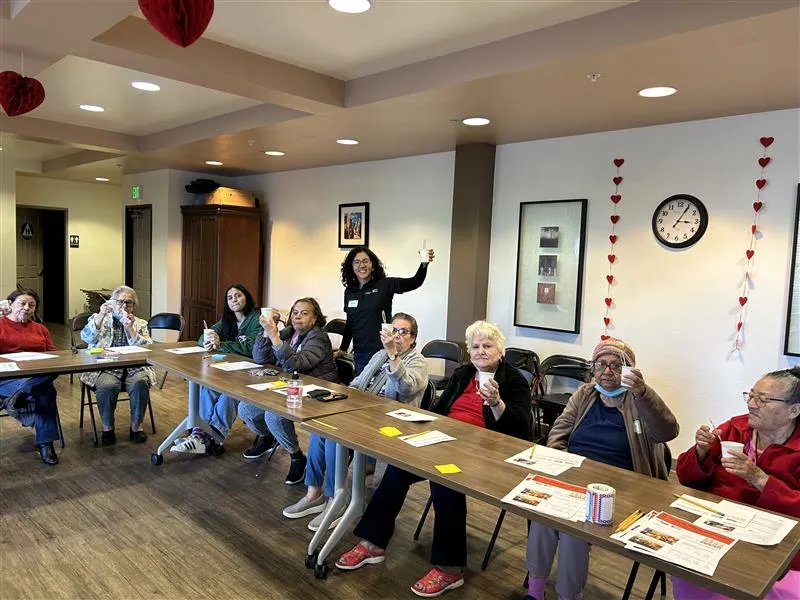Partner organizations help healthy habits take root in underserved LA communities
In neighborhoods across Los Angeles, something powerful is growing — not just in community gardens, but in kitchens, classrooms and everyday choices.
CalFresh Healthy Living (CFHL) brings free nutrition education and wellness support to people eligible for the federal Supplemental Nutrition Assistance Program (SNAP), focusing on helping families and older adults build healthier habits that last a lifetime.
As California’s version of the SNAP-Ed program, CFHL is implemented statewide by four agencies: the California Departments of Public Health and Aging, Catholic Charities of California, and the University of California (CFHL, UC). Together, these agencies reached 1.8 million Californian’s in FFY 2024 with direct education and local changes that make healthy choices easier by improving the access to, and appeal of, healthy eating and physical activity.

In counties across the state, the CFHL, UC program is delivered by UC Cooperative Extension (UCCE). CFHL, UCCE partners in Los Angeles County with trusted local organizations like the Hope Through Housing Foundation and All Peoples Community Center. Together, they bring resources into communities often overlooked, delivering nutrition and wellness classes that are making a real difference in people’s lives.
The heart of the program lives in the neighborhoods it serves — one shared recipe, one family meal, one small change at a time. One such site is Oaks on Florence, an affordable housing community for seniors in the city of Bell. This community serves mostly Hispanic older adults, many of whom face barriers such as limited access to healthy foods, chronic health conditions and a lack of culturally relevant nutrition education.
Services Tailored to Local Needs
Bilingual CalFresh Healthy Living, UCCE Community Education Specialists launched the Food Smarts curriculum, a series of interactive classes that encourage participants to share their experiences, explore new ideas and adopt sustainable, healthier habits.
“It’s incredibly rewarding to see how small changes in diet and daily habits can have a big impact on health and well-being,” said Daisy Valdez, community education supervisor with CalFresh Healthy Living, UCCE in Los Angeles County. “Our goal is to help older adults and families make informed, sustainable choices.”
Valdez also highlights the food access disparities across the county. “Some areas have plenty of high-quality food options, while others are flooded with fast food and ultra-processed products,” she said.
Before starting each new class cycle, the CalFresh Healthy Living, UCCE team meets with participants to understand their interests and needs. These conversations have led to lasting changes – like the development of community gardens and more welcoming dining environments in the centers.
Real stories, real transformation
The CFHL, UC program’s impact becomes clear through the voices of participants who’ve experienced change. In federal fiscal year 2024, CFHL, UC – in collaboration with over 850 community partners – reached 181,700 across California, improving health, habits and community connection.
One resident of Oaks on Florence living with diabetes shared that she used to consume large amounts of fast food and sugary drinks. After attending the classes, her habits changed significantly. “Now I love salads and fruits – I feel so much better,” she said.
Another resident described how her traditional diet based on rice and beans evolved.
“I started adding spinach, lettuce and carrots,” she said. “I used to think that wasn’t ‘real food’ – but now I love it!”
A participant from All Peoples Community Center, recovering from gallbladder surgery, joined the classes with his five-year-old daughter to learn more about healthy eating. “My wife and I now plan meals together, cook more at home and avoid fast food,” he said. “Even my daughter knows which foods are good for her.”
Health data illustrate need for nutrition education
Recent data underscore the importance of these efforts. According to the study Food Insecurity in Los Angeles County: Fall 2024 Update by the USC Dornsife Center for Economic and Social Research, nearly 30% of Los Angeles County residents experience nutrition insecurity, meaning they lack consistent access to healthy, nutritious food. This has serious health implications: in Los Angeles County, 1 out of 10 adults has type 2 diabetes, according to the Department of Public Health. Their data also show that 27.8% of residents have hypertension.
For new habits to stick, access to affordable fresh food is essential. That’s why CFHL, UC integrates initiatives that support nutrition education. One example is the collaboration with GrowGood Farm, which brings low-cost seasonal fruits and vegetables to communities like Oaks on Florence once a month. Residents can use their SNAP benefits to buy fresh produce without leaving their neighborhood – reinforcing the lessons from the classroom with real-world access.
Programs empower stronger, healthier communities
This transformation is not limited to participants. Staff at these centers also have experienced personal growth.
Karla Amsk, a services coordinator at three community sites, reflected on the connection residents are building with gardening. “They feel like they’re doing something good for themselves,” she said. “CalFresh Healthy Living, UC has been a tremendous help for the community.”
Yvette Sánchez, coordinator at All Peoples Community Center, also saw changes in her own health. “I had stomachaches every day; I decided to learn more about nutrition and ended up losing weight,” she said.
She took part in a workshop led by CFHL, UCCE community education specialist Ingrid Alarcón, who showed her how to build balanced meals in a practical way. “I remember being told, ‘Make sure your plate has color,’” Sánchez recalled. “Now I include more vegetables and variety to stay healthy.”
Her story is just one of many such examples across Los Angeles County, where CFHL, UCCE and partner organizations are helping participants take charge of their health.
